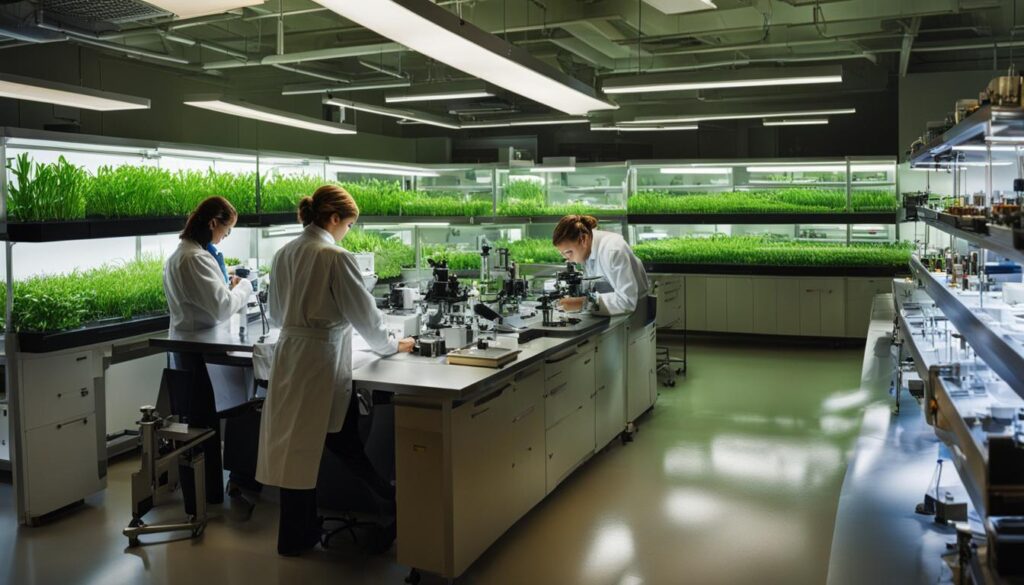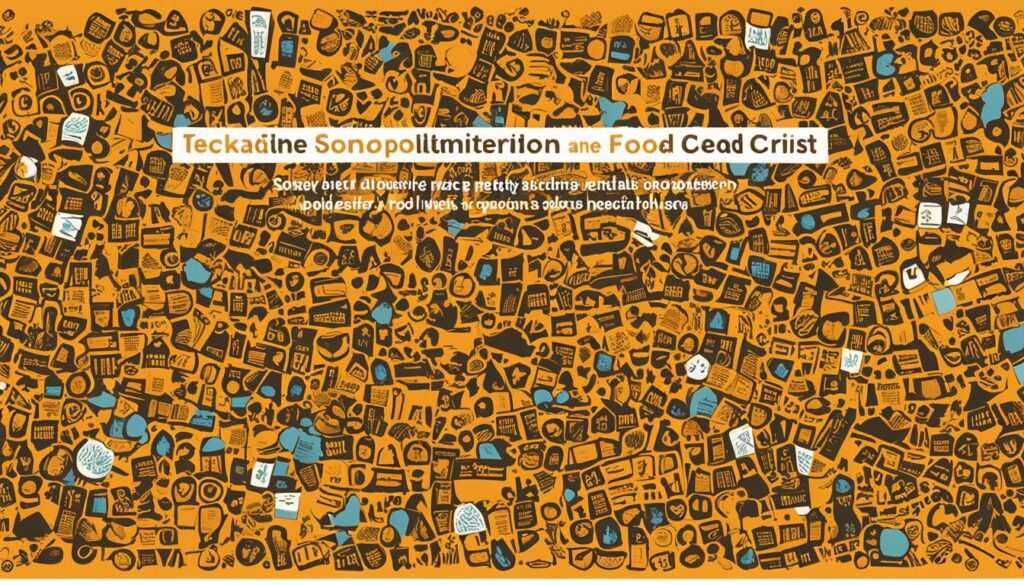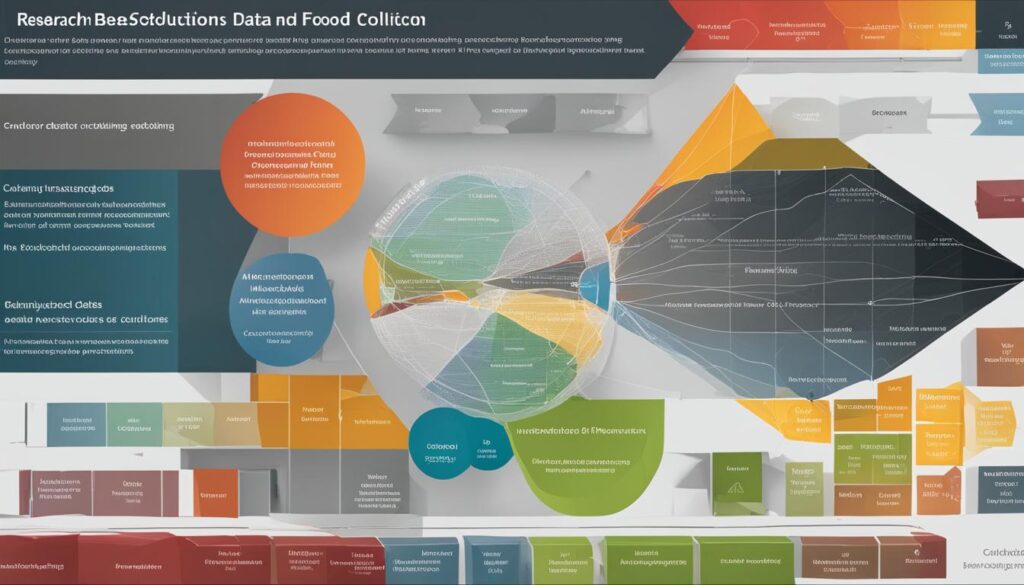When it comes to addressing the pressing issue of food crisis, sustainable agriculture holds the key to ensuring food security, alleviating hunger, and preventing famines.
Through agricultural innovation and the adoption of advanced food production techniques, we can build community resilience and strengthen supply chain management.
By implementing sustainable agricultural practices that prioritize environmental stewardship and resource efficiency, we can enhance food production while mitigating the adverse effects of climate change.
This holistic approach to food security also encompasses nutrition interventions that aim to combat malnutrition and improve the health of vulnerable populations.
Investment in Agricultural Research and Development
Countries like India and Ethiopia have recognized the importance of investing in agricultural research and development as a key solution to the food crisis.
These investments have yielded significant benefits, including increased productivity, income generation, and improved livelihoods for smallholder farmers.
High-Yielding Varieties for Increased Productivity
In India, strategic investments in agricultural research have resulted in the development of high-yielding varieties of staple crops. These improved seed varieties have played a crucial role in boosting agricultural productivity and enhancing food security for smallholder farmers.
By adopting these advanced varieties, farmers have witnessed substantial increases in their crop yields, leading to higher incomes and improved livelihoods.
Promoting Sustainable Farming Practices
Through initiatives like Ethiopia’s Agricultural Transformation Agency, agricultural research and development efforts have focused on promoting sustainable farming practices and improved seed varieties.
By introducing advanced seed technologies and promoting the use of fertilizers, Ethiopia has witnessed remarkable increases in crop yields. These advancements have not only enhanced food production but have also contributed to the economic well-being of smallholder farmers.
Enhancing Market Access and Opportunities
Market access plays a crucial role in ensuring the success of smallholder farmers. Transparent trading platforms, such as the Ghana Commodity Exchange, have been instrumental in connecting farmers with buyers, creating opportunities for fair trade and improved market access.
By effectively linking farmers to markets, these platforms help smallholder farmers secure better prices for their produce, boosting their income and overall food security.
| Country | Investment | Outcomes |
|---|---|---|
| India | Agricultural research and development | Increased productivity and income for smallholder farmers through high-yielding seed varieties |
| Ethiopia | Agricultural Transformation Agency | Introduction of improved seed varieties and promotion of sustainable farming practices leading to increased crop yields and farmer incomes |
| Ghana | Ghana Commodity Exchange | Improved market access and transparent trading platforms benefiting smallholder farmers |
By investing in agricultural research and development, countries like India and Ethiopia have demonstrated the potential for increased productivity and improved livelihoods for smallholder farmers.
These advancements not only contribute to addressing the food crisis but also pave the way for sustainable agricultural practices and enhanced food security.

Reducing Food Waste
Reducing food waste is a critical part of addressing the food crisis. By implementing effective strategies to minimize waste, we can ensure that precious resources are used efficiently and sustainably.
Several initiatives have emerged globally, showcasing the power of collective action in combating food waste and its detrimental effects on food security.
Love Food Hate Waste campaign:
The Love Food Hate Waste campaign in the UK has made significant strides in raising awareness about the issue of food waste and empowering individuals to take action. The campaign provides practical tips and resources to help individuals and households make mindful choices in meal planning, smart shopping, and proper storage to reduce food waste. Through education and engagement, this campaign has contributed to a positive shift in consumer behavior and a reduction in food waste.
Food donation laws:
In countries like France and Italy, food donation laws have been enacted to encourage businesses and individuals to donate excess food to those in need, rather than discarding it. These laws offer legal protections and incentives for food establishments to donate surplus food to food banks, shelters, and other charitable organizations. By redirecting edible food to those who are food insecure, these laws are not only reducing waste but also addressing hunger and promoting social solidarity.
Pay as you trash policy:
In South Korea, the “pay as you trash” policy provides a financial incentive for households to minimize food waste. This policy charges households based on the amount of food waste they produce, encouraging individuals to be more aware of their consumption and to only discard waste when necessary. As a result, this policy has led to a reduction in overall waste generation and increased mindfulness around food consumption.
By implementing these initiatives and policies, we can make a significant impact in reducing food waste and ensuring that edible food reaches those who need it the most. These efforts contribute to a more sustainable and resilient food system, helping to address the food crisis and create a world with zero hunger.
Image: Reducing Food Waste
Social Protection Programs as a Policy Tool
Social protection programs play a crucial role in addressing the food crisis and promoting food security. Two notable examples of successful programs are Brazil’s Bolsa Familia program and Ethiopia’s Productive Safety Net Program.
Bolsa Familia Program
The Bolsa Familia program, implemented in Brazil, has been effective in reducing poverty and improving food security for vulnerable households. It provides cash transfers to low-income families, with the condition that children must attend school and receive regular healthcare check-ups. By addressing the immediate needs of these households, the program helps alleviate poverty and ensures access to nutritious food.
Productive Safety Net Program
The Productive Safety Net Program in Ethiopia is another example of how social protection programs can contribute to food security. This program provides cash or food transfers to vulnerable households, particularly those affected by food insecurity. Beneficiaries of the program are also required to participate in public works projects, which not only provide income but also contribute to community development and resilience.
Both the Bolsa Familia program and the Productive Safety Net Program have shown positive outcomes in reducing poverty and improving food security. By addressing immediate needs and supporting vulnerable households, these social protection programs contribute to long-term solutions for the food crisis.

Implementing effective social protection programs like the Bolsa Familia program and the Productive Safety Net Program is crucial in combating the food crisis. These programs act as a safety net for vulnerable households, ensuring they have access to food and basic necessities.
Leveraging on Linkages between Research Data and Insight to Inform Policies
Addressing the food crisis requires leveraging the power of research data to inform evidence-based policies. Initiatives such as the Ghana Strategy Support Program in Ghana and the Rwanda Agricultural Board in Rwanda play a vital role in providing policymakers with the necessary insights and recommendations for enhancing agricultural productivity and food security.
By translating research results into actionable policies and programs, these initiatives contribute to sustainable solutions that tackle the challenges posed by the food crisis.
To illustrate the significance of integrating research data into policy-making, let’s take a closer look at the Ghana Strategy Support Program and the Rwanda Agricultural Board:
Ghana Strategy Support Program
The Ghana Strategy Support Program (GSSP) is an exemplary effort that fosters collaboration between policymakers, researchers, and other stakeholders. By utilizing research data and evidence-based analysis, the GSSP provides valuable insights for policymakers to enhance agricultural strategies and promote food security in Ghana.
Through the implementation of evidence-based policies, the GSSP aims to increase agricultural productivity, improve agricultural practices, and strengthen market access for smallholder farmers. By targeting these key areas, the program has the potential to drive economic growth, reduce poverty, and combat the food crisis in Ghana.
Rwanda Agricultural Board
The Rwanda Agricultural Board (RAB) is another notable institution that leverages research data to inform policies and programs. RAB conducts comprehensive research projects and studies to gather data on various aspects of agriculture, ranging from crop productivity to livestock management.
These research findings enable policymakers to make informed decisions and develop evidence-based policies that address the specific challenges faced by the agricultural sector in Rwanda.
By targeting key areas for improvement, such as crop diversification, soil fertility management, and climate resilience, RAB plays a crucial role in promoting sustainable agricultural practices and ensuring food security in the country.

By linking research data and insights with policy-making, initiatives like the Ghana Strategy Support Program and the Rwanda Agricultural Board contribute to the development of evidence-based policies that effectively tackle the food crisis.
These initiatives serve as beacons of hope, guiding policymakers in the pursuit of sustainable solutions to achieve food security for all.
Innovative Approaches to Water Harvesting and Grazing Land Management
Water scarcity poses significant challenges to agricultural productivity and food security, particularly in arid and semi-arid regions. However, innovative approaches such as water harvesting technologies and regenerative agriculture offer promising solutions to mitigate these challenges.
Water harvesting technologies:
- Rooftop rainwater harvesting systems: These systems collect rainwater from roofs and store it for agricultural use. They can help replenish groundwater and provide a reliable water source for crops even during dry seasons.
- Small-scale dams: Constructing small dams can help capture and store rainwater, creating reservoirs that can be utilized for irrigation, livestock watering, and other agricultural purposes.
Regenerative agriculture:
Regenerative agriculture is an approach that focuses on improving soil health and biodiversity through sustainable farming practices. By implementing techniques such as cover cropping and reduced tillage, regenerative agriculture enhances soil fertility, water retention, and carbon sequestration, leading to increased agricultural productivity and resilience in the face of water scarcity.
Innovative grazing land management:
Grazing lands in arid and semi-arid areas are susceptible to degradation, further exacerbating the food crisis. However, innovative grazing land management approaches can help address this issue:
- Rotational grazing: This practice involves systematically moving livestock between different grazing areas, allowing vegetation to recover and ensuring sustainable use of grazing lands. It promotes soil health, reduces erosion, and maintains biodiversity.
- Multispecies grazing: Grazing different livestock species together can optimize the use of grazing lands by utilizing varied forage sources and reducing overgrazing of specific plants. This approach enhances land productivity and improves pasture quality.
By adopting water harvesting technologies and implementing innovative grazing land management practices, communities can enhance their resilience to water scarcity, improve agricultural productivity, and contribute to long-term food security.

Conclusion
Promoting food security in developing countries requires a multifaceted approach.
By implementing a combination of strategies, including investment in research and development, improving market access, reducing food waste, implementing social protection programs, leveraging research data, utilizing innovative technologies, and finding innovative financing schemes, we can address the food crisis and promote sustainable food security for all.
Investing in research and development is crucial to developing innovative solutions that increase agricultural productivity and improve food security. By supporting smallholder farmers with improved seed varieties and providing them with market access, we can enhance their productivity and income.
Additionally, reducing food waste through campaigns and legislation can ensure that surplus food reaches those in need. Implementing social protection programs that provide cash or food transfers to vulnerable households can alleviate poverty and contribute to food security.
By leveraging research data and evidence-based policies, we can inform decision-making and implement effective measures to address the food crisis. Furthermore, utilizing innovative technologies like water harvesting and regenerative agriculture can help overcome water scarcity and promote sustainable land management practices.
FAQs
What are some effective solutions to address the food crisis?
Effective solutions to address the food crisis include sustainable agriculture practices, improving food security through investments in agricultural research and development, reducing food waste, implementing social protection programs, leveraging research data for evidence-based policies, and adopting innovative approaches to water harvesting and grazing land management.
How can investment in agricultural research and development help mitigate the food crisis?
Investment in agricultural research and development can lead to increased productivity and income for smallholder farmers through the development of high-yielding crop varieties. It can also contribute to improved seed varieties, market access, and the adoption of climate-smart agricultural innovations, which are essential for enhancing food security and reducing hunger.
What measures can be taken to reduce food waste and its impact on the food crisis?
To reduce food waste and address the food crisis, initiatives like the Love Food Hate Waste campaign, food donation laws, and the “pay as you trash” policy can be implemented. These measures focus on raising awareness, encouraging food donation, and promoting responsible consumption habits to minimize waste and ensure food reaches those in need.
How do social protection programs contribute to resolving the food crisis?
Social protection programs, such as Brazil’s Bolsa Familia program and Ethiopia’s Productive Safety Net Program, play a vital role in reducing poverty and improving food security. These programs provide cash or food transfers to vulnerable households, often with conditions like school attendance and basic healthcare, creating a safety net that contributes to poverty reduction and food security.
How can research data be linked to policymaking to address the food crisis?
Initiatives like the Ghana Strategy Support Program and the Rwanda Agricultural Board work to link research data with policy-making. They provide evidence-based recommendations to policymakers for improving agricultural productivity and food security. By translating research results into policies and programs, these efforts contribute to sustainable solutions for addressing the food crisis.
What innovative approaches can be used to manage water scarcity and grazing lands?
Innovative approaches to manage water scarcity include rooftop rainwater harvesting systems and small-scale dams. These technologies help promote agricultural productivity in arid and semi-arid regions. Additionally, regenerative agriculture, which focuses on improving soil health and biodiversity through practices like cover cropping and reduced tillage, and innovative grazing land management approaches can contribute to sustainable use of grazing lands, particularly in arid and semi-arid areas.
What is the best approach to addressing the food crisis in developing countries?
Addressing the food crisis in developing countries requires a multifaceted approach that includes investment in research and development, improving market access, reducing food waste, implementing social protection programs, leveraging research data for evidence-based policies, utilizing innovative technologies for water harvesting and grazing land management, and finding innovative financing schemes. Implementing these strategies together can help address the food crisis and promote sustainable food security for all.
Source Links
- https://www.wfp.org/global-hunger-crisis
- https://www.linkedin.com/pulse/utilizing-innovative-strategies-address-global-food-sindi-ph-d
- https://www.usaid.gov/news-information/press-releases/oct-19-2022-usaid-and-usda-announce-global-food-security-research-strategy-fight-hunger-build-sustainable-systems









